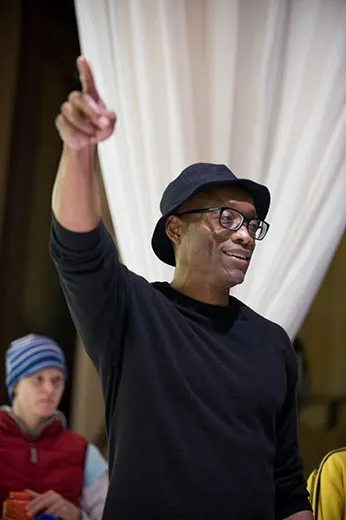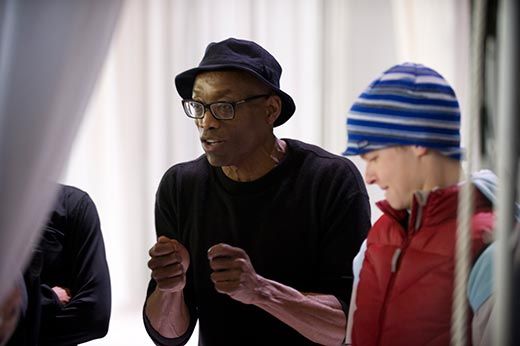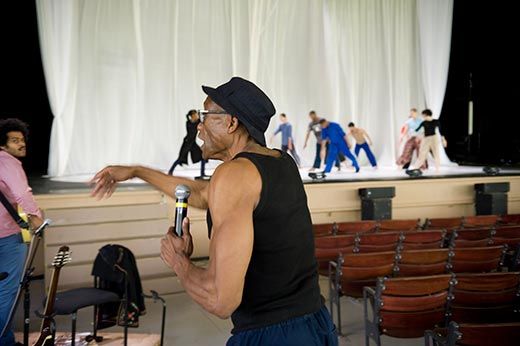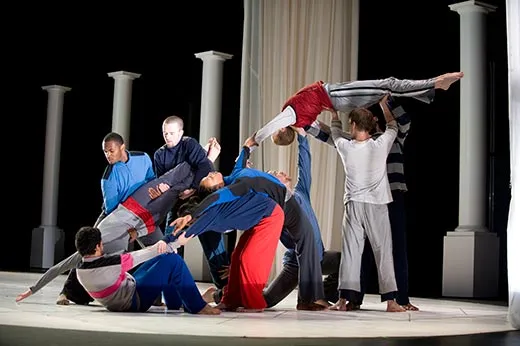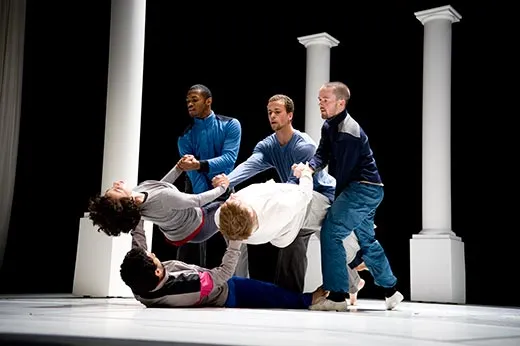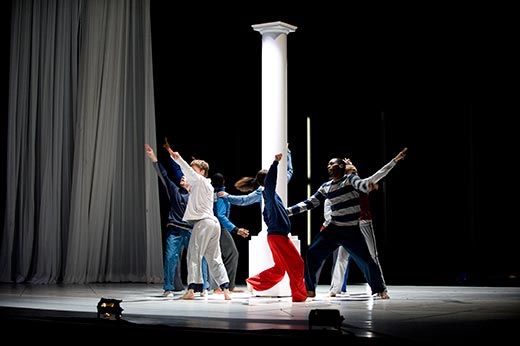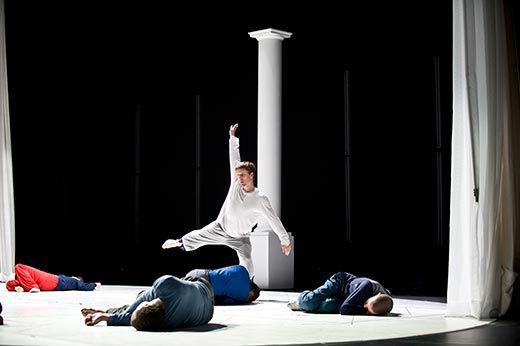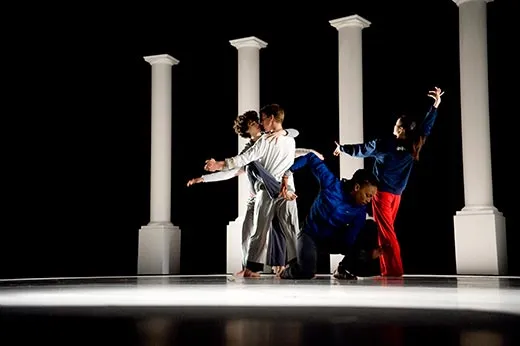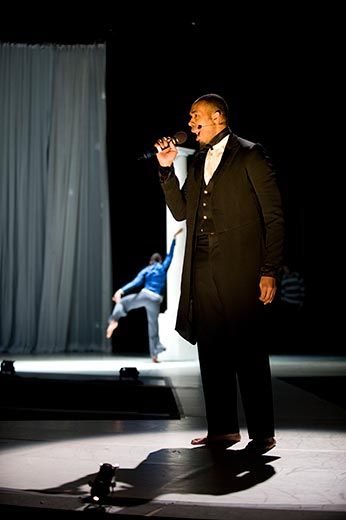Dancing Around Abraham Lincoln
Bill T. Jones, one of America’s foremost living choreographers, tackles Lincoln’s complicated legacy in his newest work
/https://tf-cmsv2-smithsonianmag-media.s3.amazonaws.com/filer/Fondly-Do-We-Hope-Fervently-Do-We-Pray-rehearsal-631.jpg)
It must be said that, in the beginning, Bill T. Jones did not want to create a dance about Abraham Lincoln. Jones, a monumental figure in his own right—he is widely considered one of the preeminent living American choreographers—had never before developed a pure work of portraiture for his company. And Lincoln definitely didn’t seem like the right subject with which to start.
“First of all, I wanted to know if it was a Black History Month idea, because I am not interested in Black History Month ideas,” Jones (who is African-American) drily recalls in his authoritative baritone. “If you’re going to offer me something, make sure it’s because you feel I’m the right person for it, and you think it’s worth doing in and of itself.”
The idea came from Welz Kauffman, president of the Ravinia Festival, an annual music and the arts celebration held outside Chicago. Kauffman hoped the piece would engage with Lincoln’s legacy on the occasion of his bicentennial. “He didn’t say no,” Kauffman recalls of Jones, chuckling. “But he certainly didn’t say yes.”
Jones has referred to Lincoln on many occasions as “the only white man I was allowed to love unconditionally,” and says of the President, “true or false, it seemed he was actually on our side.” But that, of course, as Jones immediately notes, is a child’s impression of Lincoln. Jones is now 57 and calls himself a man with few heroes. As such, when beginning the work that would eventually become Fondly Do We Hope . . . Fervently Do We Pray (premièring at Ravinia on September 17) he was reluctant to put Lincoln on a pedestal.
In many respects, Jones is the perfect choreographer to attack the sizeable subject of Lincoln. Since he and his late-life and artistic partner, Arnie Zane, created the Bill T. Jones/Arnie Zane Dance Company in 1982, Jones has become famous for creating a modern dance aesthetic that addresses major moral and social questions while retaining a wonderfully human, authentic core. The New York Times dubbed Jones a political lion for his fearlessness in tackling unpopular subjects, but, unlike most modern choreographers, his work does not pummel an audience outright with politics.
A project about Lincoln also resonates with Jones for personal reasons. He grew up the son of migrant farm workers for whom the days of slavery were a less than distant memory. “You couldn’t be a child of the civil rights struggle and not be aware of all the background of the Civil War,” he says. “The civil rights struggle and emancipation and Lincoln, all those things were some of the earliest social studies lessons I had.” Especially after reading Doris Kearns Goodwin’s Team of Rivals: The Political Genius of Abraham Lincoln, Jones became convinced that a subject that initially “seemed so facile” in fact was ripe for exploration.
When beginning work on the piece, Jones was determined it would not be a biopic, a pure retelling of Lincoln’s story. Jones began to think about Lincoln as a man whose life and times still speak to very current, adult questions. “Why do a lot of people still feel hurt? Why is there still this schism around race in this country?” he offers. And it would not ignore the very real presence of Jones’ diverse dance company and how its members’ stories fit into Lincoln’s legacy. “I would consider the work successful if Lincoln and his era are somehow a reflective surface in which we see ourselves,” Jones says. “Is that narcissistic? Well, I don’t know how else one uses historical figures, unless it’s to talk about questions we have today.”
It’s clear from speaking with Jones’ dancers that Fondly Do We Hope has certainly provoked that kind of reflection. When LaMichael Leonard, a young male dancer in the company, first heard about the commission, “I didn’t jump up and down,” he laughs. “I did not like history growing up. But the older I get, and the more I dance and create art, the more I realize how important history is. And Bill is all about pieces that talk about the past and look toward how we can progressively change our future.”
Shayla-Vie Jenkins, a female dancer and four year veteran of the company, says the piece inspired her to more deeply consider the choices made by individuals during Lincoln’s era . “If I were a black woman living in that time, who would I play?” she recalls wondering. “Would I be a Frederick Douglass? Or would I just let the situation be, because that’s how life is?” Still, she wasn’t left with any easy answers. “I would hope I’d be the fighter—the Harriet Tubman! But I don’t know.”
Jones says his thoughts toward Lincoln, too, have evolved much over the course of creating Fondly Do We Hope . . . Fervently Do We Pray. For one thing, the title was once very different. “I went through this period when I thought it was going to be, A Good Man? A Good Man! “ Jones says. “Now, I don’t think that’s the issue. I’m not putting him on trial.” He’s captivated by what Lincoln might have accomplished had he lived to serve another four years as president and wonders what hurt might have been absent from his own life had Lincoln lived to face yet more challenges.
“I think there’s something to be learned from the way he was expansive enough as an intellectual and big enough in his experience, and I dare say in his heart, that he could actually grow and try to do something that was right, for reasons that were valuable for a politician, but also for a progressive and decent human being.” He pauses a moment in thought. “He was a true leader.” From Jones, those are hard-won words.
